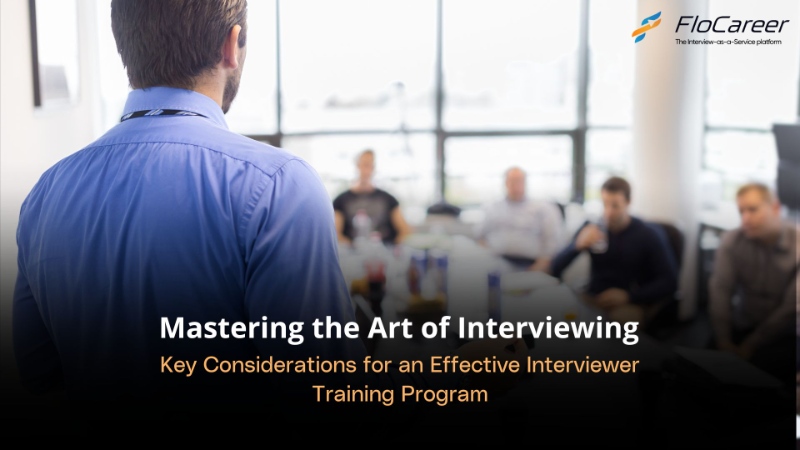Mastering the Art of Interviewing: Key Considerations for an Effective Interviewer Training Program
In the ever-evolving landscape of talent acquisition, the role of an interviewer transcends mere conversation—it is a strategic element crucial for securing top-tier talent. Crafting an effective interviewer training program entails more than routine checklists; it is a dynamic endeavor to empower your team with the skills necessary to identify, assess, and secure the best candidates. This in-depth guide will delve into crucial considerations for creating a robust interviewer training program, drawing inspiration from industry best practices and insights.

Understanding the Dynamic Landscape
1. Tailoring Content for Diverse Skill Levels:
Embarking on an interviewer training program requires acknowledging the diverse skill levels within your team. To ensure a cohesive learning experience, tailor the content to cater to both novice interviewers and seasoned professionals. This inclusive approach enhances the overall effectiveness of the training.
2. Role-Specific Training Modules:
Recognize the varying needs of interviewers across different roles within your organization. Develop role-specific training modules that address the unique requirements of each position. This targeted approach ensures that the training program is directly applicable to the daily challenges and expectations of interviewers.
Embracing Best Practices
3. Behavioral Interviewing Techniques:
Behavioral interviewing is a cornerstone of effective talent assessment. As part of the training program, equip your interviewers with the skills to utilize this technique. Behavioral interviewing allows interviewers to delve into a candidate's past behavior, predicting future performance with accuracy.
4. Consistency in Evaluation:
Maintaining consistency is paramount when evaluating candidates. Provide clear guidelines to ensure interviewers assess candidates based on predefined criteria. This not only minimizes biases but also establishes a fair and standardized evaluation process across the organization.
Leveraging Technology for Training Enhancement
5. Video Interviewing Training:
With the increasing prevalence of remote work, video interviews have become integral to the hiring process. Enhance your training program by incorporating modules on effective video interviewing techniques. Cover aspects such as virtual engagement, clear communication, and technology troubleshooting to prepare interviewers for diverse scenarios.
6. AI Integration in Training:
Leverage technology to elevate training effectiveness. Explore the integration of AI tools to simulate interview scenarios, providing real-time feedback to interviewers. This not only facilitates continuous improvement but also familiarizes interviewers with innovative approaches to candidate assessment.
Encouraging Continuous Learning and Development
7. Establishing a Feedback Loop:
Cultivate a culture of continuous improvement by establishing a feedback loop within your organization. Encourage interviewers to share their experiences and insights, fostering collaboration and mutual learning. A feedback loop contributes to ongoing refinement of interviewing skills.
8. Resources for Self-Guided Learning:
Empower interviewers with resources for self-guided learning. Offer access to industry publications, webinars, and online courses covering the latest trends and best practices in interviewing. Providing these resources ensures that interviewers stay abreast of industry developments.
9. Peer-to-Peer Learning Sessions:
Facilitate peer-to-peer learning sessions where interviewers can share their success stories, challenges, and effective strategies. These sessions foster a sense of community and allow interviewers to learn from each other's experiences, contributing to a collaborative learning environment.
10. Scenario-Based Training Workshops:
Conduct scenario-based training workshops that simulate real-world interview situations. These workshops allow interviewers to practice their skills in a controlled environment, receive constructive feedback, and enhance their ability to handle various scenarios effectively.
11. External Expert Sessions:
Bring in external experts or industry leaders for specialized training sessions. These sessions can provide fresh perspectives, introduce the latest industry trends, and offer valuable insights that contribute to the continuous development of your interviewers.
Monitoring and Evaluation for Program Optimization
12. Regularly Updating Training Material:
The recruitment landscape is dynamic, necessitating regular updates to training materials. Incorporate the latest industry trends to keep interviewers ahead of the curve. Regular updates ensure the program remains relevant and aligned with emerging practices.
13. Implementing Key Performance Indicators (KPIs):
To measure the effectiveness of your interviewer training program, establish Key Performance Indicators (KPIs). Track metrics such as interviewer satisfaction, candidate experience, and hiring success rates. These KPIs provide insights into the program's impact and identify areas for continuous improvement.
In conclusion, developing an effective interviewer training program is an investment that yields dividends in the quality of your hires. By understanding the dynamic landscape, embracing best practices, leveraging technology, encouraging continuous learning, and implementing robust monitoring and evaluation processes, you create a program that equips your team with the skills needed to conduct successful interviews. Empower your interviewers by partnering with industry leaders like FloCareer to tailor solutions that align with your unique needs and objectives. Elevate your interviewing process, unlock the potential for success in your recruitment efforts, and ensure that every interviewer becomes a key asset in the quest for top talent.
As organizations navigate the complexities of the hiring process, the culmination of tailored content, role-specific modules, and the embrace of best practices ensures that interviewers are equipped with a diverse skill set. By leveraging technology, fostering continuous learning, and implementing robust monitoring processes, the program becomes a catalyst for ongoing improvement. This investment is not just a routine endeavor but a strategic commitment to the quality of hires and the overall success of the organization. As you embark on this journey of mastery, consider collaboration with industry leaders such as FloCareer, whose expertise can further tailor solutions, ensuring your interviewing process is not just efficient but a beacon of innovation and excellence in talent acquisition. The empowered interviewer becomes a key asset, driving the organization toward unparalleled success in securing and nurturing top talent.
Want to ensure high interview quality, check out our latest blog.


